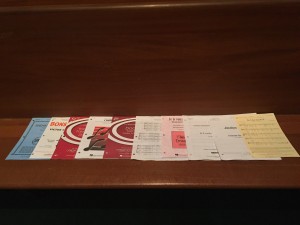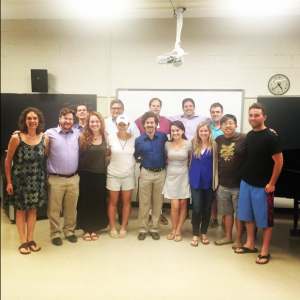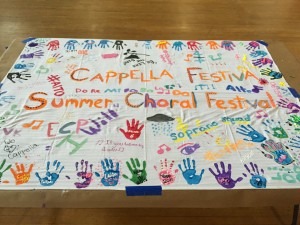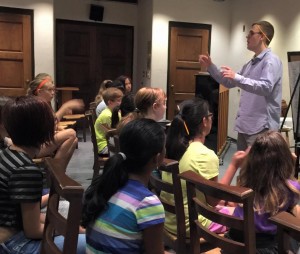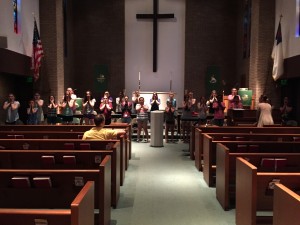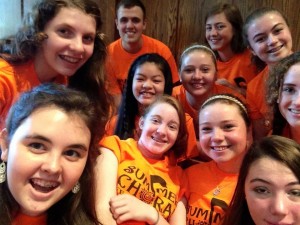This summer, I worked with Professor Christine Howlett on researching treble choir repertoire, developing curriculums to teach said repertoire and music theory/vocal musicianship to young musicians, and studying choir management software solutions. I also had the opportunity to travel to two conferences at Yale University and Westminster Choir College to learn more about the ways choral music can transform lives. The capstone experience of my summer was co-conducting and teaching at the Cappella Festiva Treble Choir Summer Choral Festival, a one week music program for singers ages 10-18.
Assembling a library of new treble choir repertoire was my first task. When researching choral music, one must be diligent in ensuring that they are choosing pieces that are interesting, varied in terms of genre, time period, accompaniment, tonality, tempo, etc., and accessible for the ensemble that is being programmed for (four vocal parts vs. two, for example). I logged many hours on the web and had great resources from music websites such as JWPepper and Graphite Publishing. Below are some of our newfound favorite pieces (many of which we programmed for the aforementioned Summer Choral Festival):
Having lots of new music to program and perform is crucial to staying relevant and successful in music. But, equally important is having a solid curriculum in place to teach the musicianship skills that are vital to achievement with the music. I compiled many methods that music educators employ in their pedagogies. Professor Howlett and I then chose the strategies that we felt would affect most immediate change in young singers and created a curriculum centered around them to be used in the Summer Choral Festival. The strategies that we chose included the use of body percussion (to help singers internalize rhythm and pulse), solfège scales and syllables, or “do re mi fa sol la ti do” as many know it (helps improve accuracy of pitch and tuning; part of the “Kodály Method”), and teaching rounds and canons (quickly develops independence of parts and aural skills necessary for accurate rhythm and harmony).
The administrative tasks that a conductor must perform are fundamental in directing a successful choral ensemble. Professor Howlett and I researched multiple online choral management softwares that provide a portable platform for choral administration. They included Groupanizer, Chorus Connection, and HarmonySite. These platforms are extremely complex and powerful, so we spent quite a bit of time analyzing and studying their functionality. We compared their handling of event planning and organization, membership management, invoicing options, learning file upload capabilities, communication systems, and even visual representations with riser placements of singers at concerts (which has a large impact in the overall sound).
In June, I traveled to Yale University to attend a conference featuring a symposium titled “Choirs Transforming Lives.” Hosted by the Yale International Choral Festival and the Connecticut American Choral Directors’ Association, the symposium featured many notable guest panelists that spoke about their experiences and successes in various choral music fields. One of the panelists was a music therapist who shared her methods of musical pedagogy in the context of young people with special needs. Another was a music scholar who spoke about the implications of choral music in political and socioeconomic contexts and the ways in which society is making use of the dissemination and teaching of song. I also traveled to Westminster Choir College in Princeton, NJ to attend a workshop in choral conducting. I was introduced to even more excellent repertoire and theory techniques and learned how vital the conductor’s pedagogy and methods are in the success of the ensemble.
I had the privilege of being a part of an incredible practical application experience during the final week of my Ford project. I used all the knowledge that I obtained from summer research to conduct and teach music theory/vocal musicianship at the Cappella Festiva Treble Choir Summer Choral Festival. Along with Professor Howlett, I worked with a talented and driven group of 27 young musicians over the week and saw immediate and inspiring change right before my eyes. The students went from a group of strangers on Day 1 to a bonded and sonorous choir with incredible artistry by the final concert at Vassar on Day 6. I had never worked with an ensemble in the age range of 10-18 nor one with only treble voices. But with the research and preparation I had conducted in the weeks prior, I was able to adapt to the singers and provide them with a fulfilling and fun experience both in and outside of rehearsals.
There are many facets of choral music that work together behind the scenes of the ensemble that sings beautifully at their performance. Careful consideration of all of them is what makes the music happen on stage. Being a part of a choir is being a part of something bigger than oneself – and that is magic.
Nick Ruggeri ’18

